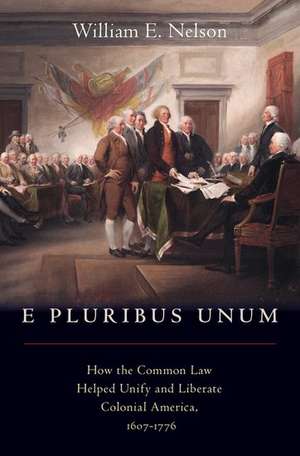E Pluribus Unum: How the Common Law Helped Unify and Liberate Colonial America, 1607-1776
Autor William E. Nelsonen Limba Engleză Hardback – 10 sep 2019
Preț: 249.20 lei
Preț vechi: 290.69 lei
-14% Nou
Puncte Express: 374
Preț estimativ în valută:
47.68€ • 49.79$ • 39.46£
47.68€ • 49.79$ • 39.46£
Carte disponibilă
Livrare economică 04-10 martie
Preluare comenzi: 021 569.72.76
Specificații
ISBN-13: 9780190880804
ISBN-10: 0190880805
Pagini: 288
Dimensiuni: 236 x 160 x 28 mm
Greutate: 0.54 kg
Editura: Oxford University Press
Colecția OUP USA
Locul publicării:New York, United States
ISBN-10: 0190880805
Pagini: 288
Dimensiuni: 236 x 160 x 28 mm
Greutate: 0.54 kg
Editura: Oxford University Press
Colecția OUP USA
Locul publicării:New York, United States
Recenzii
Nelson's historiographic goal, which he unquestionably succeeds at, is encouraging further research on how different structures of colonial government benefited different interests and social groups. Nelson offers up ample places for historians to delve deeper, focusing on specific geographic regions, temporal periods, or legal developments. There is clearly a great depth within this subject, and in that regard Nelson sets up other historians to do that work, while simultaneously drawing meaningful conclusions in a work committed to breadth.
...fascinating details...compelling analyses...
William Nelson's 'new narrative' of government and law in British North America is an excellent and much-needed intervention that will broaden our way of thinking about the origins of the American Union and, eventually, the creation of the American nation.
Nelson's studyproductivelysynthesizesAmericancolonial and legal history,emphasizing local powerin the colonial era and the gradual evolution of nationalinstitutions andthelegal professionfromlocaland regional roots. This valuablebookwill be important forlawand graduate history students, as well asupper-levelundergraduatesinearly American courses.
William Nelson's masterful study will forever banish the view that English law was transplanted to the American colonies. It shows that colonial courts produced striking legal diversity, and lawyers gradually forged convergence through strategic adaptations of the common law. Original, clear, and grounded in extensive research-this book is required reading for anyone interested in the origins of law and governance in early America.
...fascinating details...compelling analyses...
William Nelson's 'new narrative' of government and law in British North America is an excellent and much-needed intervention that will broaden our way of thinking about the origins of the American Union and, eventually, the creation of the American nation.
Nelson's studyproductivelysynthesizesAmericancolonial and legal history,emphasizing local powerin the colonial era and the gradual evolution of nationalinstitutions andthelegal professionfromlocaland regional roots. This valuablebookwill be important forlawand graduate history students, as well asupper-levelundergraduatesinearly American courses.
William Nelson's masterful study will forever banish the view that English law was transplanted to the American colonies. It shows that colonial courts produced striking legal diversity, and lawyers gradually forged convergence through strategic adaptations of the common law. Original, clear, and grounded in extensive research-this book is required reading for anyone interested in the origins of law and governance in early America.
Notă biografică
William E. Nelson is Judge Edward Weinfeld Professor of Law, New York University. In 1961, he founded the Legal History Colloquium at NYU Law School, where nearly 100 younger scholars have held fellowships and received post-graduate training, and has presided over the Colloquium since that time. He has been writing and teaching in the field of American legal history for nearly fifty years and is the author of many books, including four volumes of The Common Law in Colonial America (Oxford), The Roots of American Bureaucracy, Americanization of the Common Law, and The Fourteenth Amendment.
